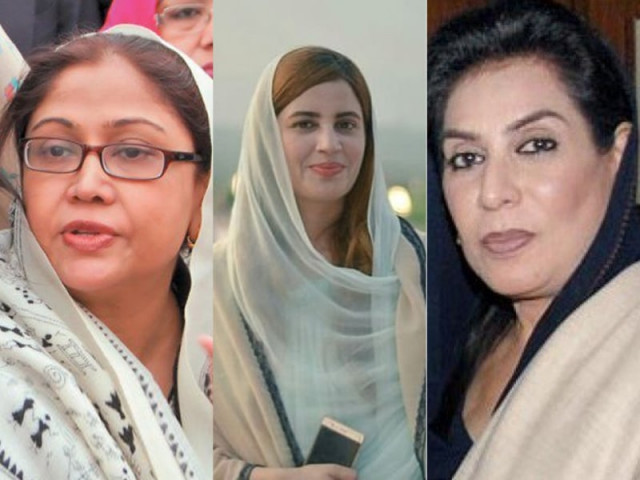More women elected from Sindh, K-P than Punjab
Of 270 electable NA seats, around 300 women contest general polls

Of the 270 electable National Assembly seats — excluding 60 reserved seats — around 300 were contested by women. This number was confirmed by the Election Commission of Pakistan (ECP) prior to the polls. This number also accounts for 297 Punjab Assembly seats, 130 from Sindh Assembly; 124 and 65 from Khyber-Pakhtunkhwa (K-P) and Balochistan assemblies respectively.
Defeating the Leghari 'dynasty'
Unofficial results pouring in have shown a surprising number of seats that Pakistan Tehreek-e-Insaf (PTI) has secured. NA-191, Dera Ghazi Khan-III was bagged by PTI candidate Zartaj Gul Wazir against Pakistan Muslim League-N (PML-N) candidate Awais Ahmed Leghari. Wazir won the seat with 25,268 votes against veteran politician Leghari, formerly affiliated with PML-N and Pakistan Muslim League-Q, also served as Federal Minister of Power under former Prime Minister Shahid Khaqan Abbasi's cabinet from October 2017 to May 2017.
In DG Khan, where Legharis have long maintained their stronghold, 33-year-old Wazir entered politics to fight the "elite" and "dynasties".
A fifth for Femida Mirza
The 2018 general election has also resulted in landmark victory for Fehmida Mirza, who has been elected Member of National Assembly (MNA) for the fifth time. Mirza was a Grand Democratic Alliance (GDA) candidate in the current polls against Pakistan Peoples Party (PPP) candidate Rasool Bux Chandio. She won NA-230 Badin with a total of 96,875 votes; whereas Chandio obtained 96,015 votes, according to unofficial numbers.
Mirza is a seasoned politician who joined GDA along with her husband in June 2013. She also contested the polls from PS-73 Dadu-III in which she attained second position with 38,091 votes. PPP's Taj Muhammad secured victory from the constituency with 40,530 votes, as per unofficial results.
More women hail from Sindh than elsewhere
While Pakistan Peoples Party Parliamentarians (PPPP) won less seats in Sindh than expected, woman parliamentarian Faryal Talpur, according to unofficial figures, bagged PS-10 (Shikarpur-II) with 53,627 votes against PTI's Ameer Buksh Khan who stands at second position with a total of 37,665 votes. In 2013, Talpur won NA-207 from Larkana which was her second time of being MNA.
PPP's Nafisa Shah leads against GDA's Syed Ghos Ali Shah from a 61,982 votes. MNA for a decade, Shah barreled a total of 99,747 votes.
To add to women representation in the parliament, Shazia Jannat Marri from PPP bagged NA-216 with 81,571 votes against runner up Kishan Chand Parwani from GDA.
Who lost?
However, PPP maestro Shehla Raza lost NA-243 Karachi East-II to PTI supremo Imran Khan. Raza obtained 10,631 votes whereas Khan achieved a historic win with 93,358 from the constituency. Muttahida Qaumi Movement-Pakistan (MQM-P) candidate Ali Raza Abidi trailed with 24,082 from the same constituency. Raza served two consecutive terms in Sindh Assembly as deputy speaker.
Another massive defeat was awarded to Pak Sarzameen Party (PSP) contestant Fauzia Kasuri who lost NA-247 Karachi South-II to PTI's Imran Ismail. Kasuri is a consummate politician who was among founding PTI members; and joined Mustafa Kamal-led PSP earlier this year. She termed her resignation from Khan's party as the “final nail in the coffin” and said she cannot defend the party’s actions anymore.
Among other contesting candidates, Jamote Qaumi Movement's Majida Abro from PB-7 Ziarat lost to Balochistan Awami Party's (BAP) Sarfaraz Chakar Domki. PTI's Hameeda Shahid lost PK-10 Upper Dir-I to PPPP's Malak Badshah Saleh. She ranks at third position with 10,904 votes whereas Saleh swept double votes compared to her.
From the Punjab, Independent candidate Razia Ghulam Ahmed Khan lost PP-46 to Independent Syed Saeed Ul Hassan. PML-N candidate Shamoona Ambreen from NA-189 lost her constituency to PTI's Sheraz Mehmood.
Results show that Sindh and K-P elected more women lawmakers compared to Punjab and Balochistan. The same trend has been observed in the National Assembly where more lawmakers hailed from Sindh.



















COMMENTS
Comments are moderated and generally will be posted if they are on-topic and not abusive.
For more information, please see our Comments FAQ